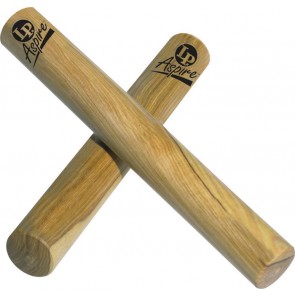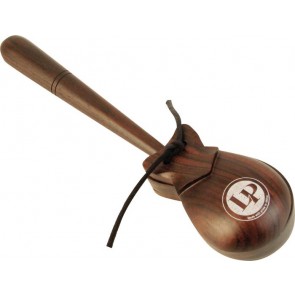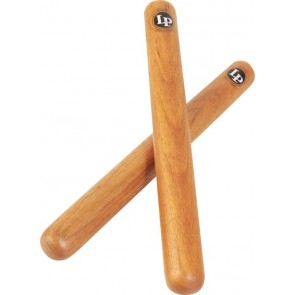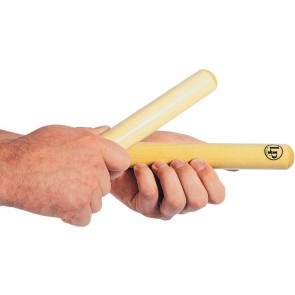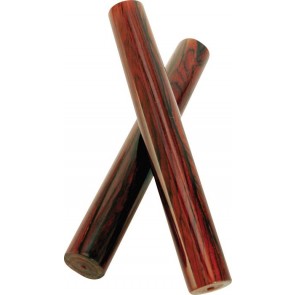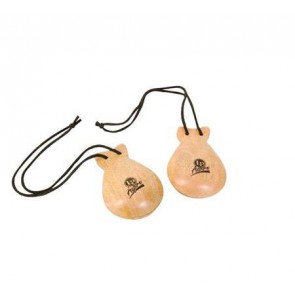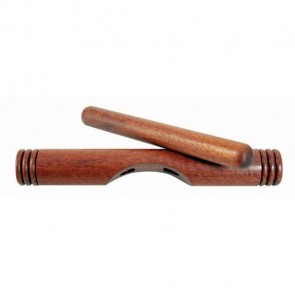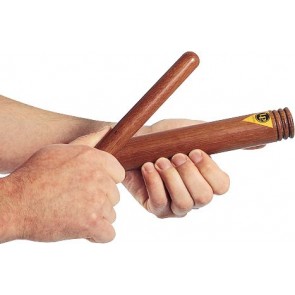Latin Percussion
-
Latin Percussion Aspire Clave
Clave (pronounced clah’ vay) is the rhythmic pattern that forms the basis of Latin music. Clave is phrased in what is known as a 3⁄2 (forward clave) or 2⁄3 (backward clave) feel. That is, three beats then two beats or, two beats then three beats. Claves are the traditional instruments used to play clave and are comprised of two sticks that are struck together to get a sharp, cracking sound. One is called the Clave or male, while the other is the Striker or female. The Clave lays in one hand between the fingertips and the heel of the hand, with the thumb out for support. This space between the Clave and the palm of the hand creates a sound chamber. The Striker is held as a beater in the other hand and is struck against the Clave. Learn More -
Latin Percussion Single Professional Castanet Set
Three styles of professional castanets designed to meet the needs of any percussionist Learn More -
Latin Percussion Exotic Hardwood Traditional Clave
Clave (pronounced clah’ vay) is the rhythmic pattern that forms the basis of Latin music. Clave is phrased in what is known as a 3⁄2 (forward clave) or 2⁄3 (backward clave) feel. That is, three beats then two beats or, two beats then three beats. Claves are the traditional instruments used to play clave and are comprised of two sticks that are struck together to get a sharp, cracking sound. One is called the Clave or male, while the other is the Striker or female. The Clave lays in one hand between the fingertips and the heel of the hand, with the thumb out for support. This space between the Clave and the palm of the hand creates a sound chamber. The Striker is held as a beater in the other hand and is struck against the Clave. Learn More -
Latin Percussion Maple Traditional Clave
Clave (pronounced clah’ vay) is the rhythmic pattern that forms the basis of Latin music. Clave is phrased in what is known as a 3⁄2 (forward clave) or 2⁄3 (backward clave) feel. That is, three beats then two beats or, two beats then three beats. Claves are the traditional instruments used to play clave and are comprised of two sticks that are struck together to get a sharp, cracking sound. One is called the Clave or male, while the other is the Striker or female. The Clave lays in one hand between the fingertips and the heel of the hand, with the thumb out for support. This space between the Clave and the palm of the hand creates a sound chamber. The Striker is held as a beater in the other hand and is struck against the Clave. Learn More -
Latin Percussion Grenadilla Wood Clave
Clave (pronounced clah’ vay) is the rhythmic pattern that forms the basis of Latin music. Clave is phrased in what is known as a 3⁄2 (forward clave) or 2⁄3 (backward clave) feel. That is, three beats then two beats or, two beats then three beats. Claves are the traditional instruments used to play clave and are comprised of two sticks that are struck together to get a sharp, cracking sound. One is called the Clave or male, while the other is the Striker or female. The Clave lays in one hand between the fingertips and the heel of the hand, with the thumb out for support. This space between the Clave and the palm of the hand creates a sound chamber. The Striker is held as a beater in the other hand and is struck against the Clave. Learn More -
Latin Percussion Aspire Handheld Castanets (2 Pair)
Designed to offer the student or educator a value packed product with an authentic sound Learn More -
Latin Percussion African Clave
Clave (pronounced clah’ vay) is the rhythmic pattern that forms the basis of Latin music. Clave is phrased in what is known as a 3⁄2 (forward clave) or 2⁄3 (backward clave) feel. That is, three beats then two beats or, two beats then three beats. Claves are the traditional instruments used to play clave and are comprised of two sticks that are struck together to get a sharp, cracking sound. One is called the Clave or male, while the other is the Striker or female. The Clave lays in one hand between the fingertips and the heel of the hand, with the thumb out for support. This space between the Clave and the palm of the hand creates a sound chamber. The Striker is held as a beater in the other hand and is struck against the Clave. Learn More -
Latin Percussion Standard Clave
Clave (pronounced clah’ vay) is the rhythmic pattern that forms the basis of Latin music. Clave is phrased in what is known as a 3⁄2 (forward clave) or 2⁄3 (backward clave) feel. That is, three beats then two beats or, two beats then three beats. Claves are the traditional instruments used to play clave and are comprised of two sticks that are struck together to get a sharp, cracking sound. One is called the Clave or male, while the other is the Striker or female. The Clave lays in one hand between the fingertips and the heel of the hand, with the thumb out for support. This space between the Clave and the palm of the hand creates a sound chamber. The Striker is held as a beater in the other hand and is struck against the Clave. Learn More

